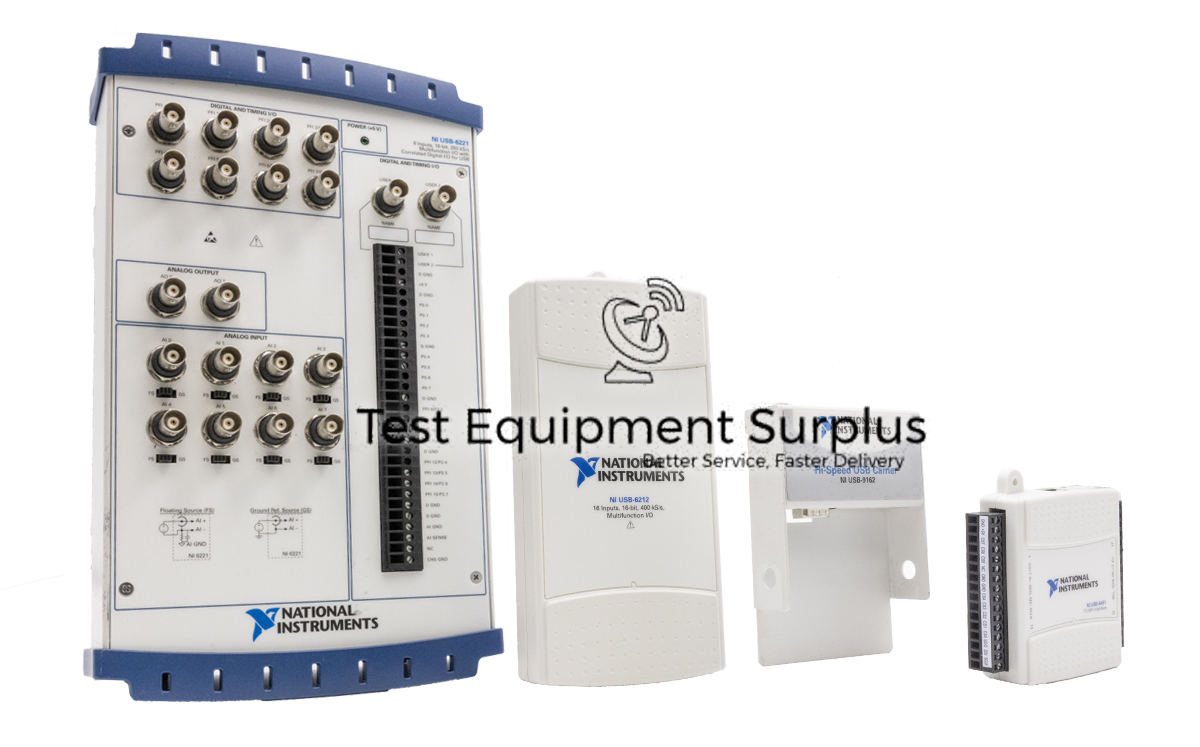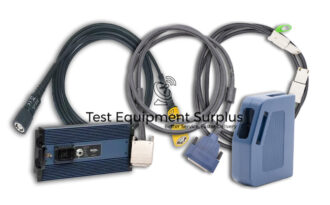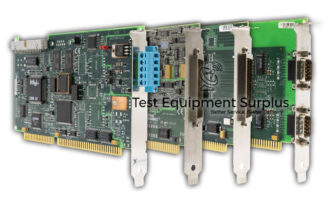Description
The National Instruments USB-5132 Oscilloscope is a versatile device with a range of part numbers including 780468-01, 779969-01, 780468-02, and 779969-02, designed to facilitate various applications with its 2-channel configuration and 8-bit resolution. It offers a 50 MHz bandwidth and a sampling rate of up to 50 MS/s, making it suitable for capturing fast signals. This oscilloscope features two BNC type analog input connectors and supports AC, DC, and GND coupling types, along with an input impedance of 1 MΩ ±1%.
An additional feature is the PFI line, which allows for external clock and trigger in/out functionalities, enhancing the device’s flexibility. The sample clock rate ranges from 763 S/s to 50 MS/s, and the onboard time base frequency is 50 MHz with an accuracy of ±50 ppm. Users can also utilize an external sample clock frequency from 1 MHz to 50 MHz if needed.
For software support, the NI USB-5132 is compatible with NI-SCOPE 3.4 and later versions, and it comes with the NI-SCOPE Soft Front Panel for interactive control. This comprehensive feature set makes the National Instruments USB-5132 Oscilloscope an excellent tool for a wide range of measurement tasks.
| Feature | Description |
|---|---|
| Product Name | National Instruments USB-5132 Oscilloscope |
| Part Numbers | 780468-01, 779969-01, 780468-02, 779969-02 |
| Channels | 2-Channel |
| Resolution | 8-Bit |
| Bandwidth | 50 MHz |
| Sampling Rate | 50 MS/s |
| Input Connectors | Two BNC type analog input connectors |
| Coupling Types | AC, DC, GND |
| Input Impedance | 1 MΩ ±1% |
| PFI Line | For external clock and trigger in/out |
| Sample Clock Rate | 763 S/s to 50 MS/s |
| Time Base Frequency/Accuracy | 50 MHz / ±50 ppm |
| External Sample Clock Frequency | 1 MHz to 50 MHz |
| Driver Support | NI-SCOPE 3.4 and later |
| Soft Front Panel | NI-SCOPE Soft Front Panel |
Question 1: What are the input impedance and the coupling types supported by the National Instruments USB-5132 Oscilloscope?
Answer 1: The National Instruments USB-5132 Oscilloscope is configured to effectively capture fast signals that fall within its 50 MHz bandwidth and can be sampled at rates up to 50 MS/s.
Question 2: What are the key specifications and software compatibility details of the National Instruments USB-5132 Oscilloscope?
Answer 2: The National Instruments USB-5132 Oscilloscope supports an input impedance of 1 MΩ ±1% and accommodates AC, DC, and GND coupling types.
Question 3: What types of signals is the National Instruments USB-5132 Oscilloscope configured to capture effectively with its 50 MHz bandwidth and 50 MS/s sampling rate?
Answer 3: The National Instruments USB-5132 Oscilloscope is suitable for a wide range of measurement tasks due to its 2-channel configuration, 8-bit resolution, 50 MHz bandwidth, sampling rate of up to 50 MS/s, two BNC type analog input connectors, support for AC, DC, and GND coupling types, an input impedance of 1 MΩ ±1%, a Programmable Function Interface (PFI) line for external clock and trigger functionalities, a versatile sample clock
Question 4: What are the specifications and features that make the National Instruments USB-5132 Oscilloscope suitable for a wide range of measurement tasks?
Answer 4: The National Instruments USB-5132 Oscilloscope is suitable for a wide range of measurement tasks due to its 2-channel configuration, 8-bit resolution, 50 MHz bandwidth, and sampling rate of up to 50 MS/s, which allows for capturing fast signals; it also features two BNC type analog input connectors, supports AC, DC, and GND coupling types, has an input impedance of 1 MΩ ±1%, includes a PFI line for external clock and trigger
Question 5: What features and specifications make the National Instruments USB-5132 Oscilloscope suitable for a wide range of measurement tasks?
Answer 5: The National Instruments USB-5132 Oscilloscope boasts key specifications such as a 2-channel configuration, 8-bit resolution, a 50 MHz bandwidth, a sampling rate of up to 50 MS/s, two BNC type analog input connectors, AC/DC/GND coupling types, and an input impedance of 1 MΩ ±1%. It also features a PFI line for external clocking and triggering, a sample clock rate between 763 S/s and 50 MS/s



